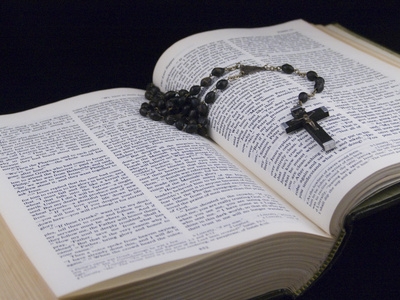The Body and Blood of Christ
Meditation and Questions for Reflection or Group Discussion
(Deuteronomy 8:2-3,14-16; Psalm 147:12-15,19-20; 1 Corinthians 10:16-17; John 6:51-58)
Receiving the Body and Blood of Christ and the Promise of His Second Coming
Not by bread alone does man live. (Deuteronomy 8:3)
Imagine entering a restaurant where the owner promises: “Our food will give you so much vitality that you’ll never go hungry again. Not only that, you’ll never weaken, get sick, or even die!” Wouldn’t you think that the owner was either a con artist or deranged? Yet in a spiritual sense, this is the claim that Jesus made when he said that he was “the bread that came down from heaven. … Whoever eats this bread will live forever” (John 6:58).
“This bread” that Jesus is talking about is the life that he offers to us every time we celebrate the Eucharist. He is the food that makes us immortal, the drink that quenches our thirst forever. Sound impossible? Not for anyone who believes that “all things are possible for God” (Mark 10:27)!
Have you ever noticed how much of an emphasis Jesus placed on his promise that those who ate of him in faith will live forever: “I will raise him on the last day” (John 6:54)? Imagine: We will have a glorified body that will radiate the very holiness and power of our God!
This promise of the Second Coming pervades the celebration of the Mass. The Nicene Creed, for instance, states that Jesus will “come again in glory.” In the Sanctus, we proclaim: “Blessed is he who comes in the name of the Lord.” Even the Memorial Acclamation is emphatic: “Christ has died, Christ is risen, Christ will come again.” This short prayer, in fact, sums up the entire gospel message—and one-third of that prayer is the Second Coming!
At every Mass, we are reminded that Jesus will return. The exact hour is hidden in God’s design, yet we can be certain that he will come again as the King of Love. For this, we should always give praise!
“Lord Jesus, we await your coming. You will come in power, yet in tenderness. May we prepare for your coming by our faith, hope, and love.”
(Many thanks to The Word Among Us (www.wau.org) for allowing us to use meditations from their monthly devotional magazine. Used with permission.)
Questions for Reflection/Discussion
- The first reading tells us to “remember” what the Lord has done for us and not to “forget” him. And yet we can often receive the Eucharist in a blank or unfocused manner. How would you describe what Jesus did for you on the Cross? How can you better use your memory of the Lord’s great love for you, and what he has done for you through his death and resurrection, in preparing to receive Christ in the Eucharist?
- We are also told we are to be fed by “every word that comes from the mouth of the Lord”. What steps can you take to better incorporate Scripture reading in your day?
- The responsorial psalm tells of all the wonderful things God has done: he has “strengthened,” “blessed,” “granted peace,” and “proclaimed his word” to us. And “with the best of wheat he fills” us. The word “eucharist” means thanksgiving. What are the things you are thankful to the Lord for?
- In the second reading from the letter to the Corinthians, St. Paul says that because we all partake of the same loaf, we, though many, are one. We have probably all experienced some kind of division within our family and parish, and among friends, colleagues, and neighbors. Who are the people in your life with whom you need to be reconciled? How might you begin to break down the walls of division and unforgiveness, and start the process of reconciliation?
- In the Gospel reading, Jesus tells us that “Whoever eats my flesh and drinks my blood remains in me and I in him.” What are the little things you can do during the day to make yourself more aware of Jesus’ presence in you?
(The discussion questions were created by Maurice Blumberg, the Director of Partner Relations for The Word Among Us Partners, (http://www.waupartners.org/), a Ministry of The Word Among Us (www.wau.org) to the Military, Prisoners, and women with crisis pregnancies or who have had abortions. Maurice was also the founding Executive Director of the National Fellowship of Catholic Men (http://www.nfcmusa.org/), for which he is currently a Trustee. Maurice can be contacted at mblumberg@wau.org or mblumberg@aol.com.)

